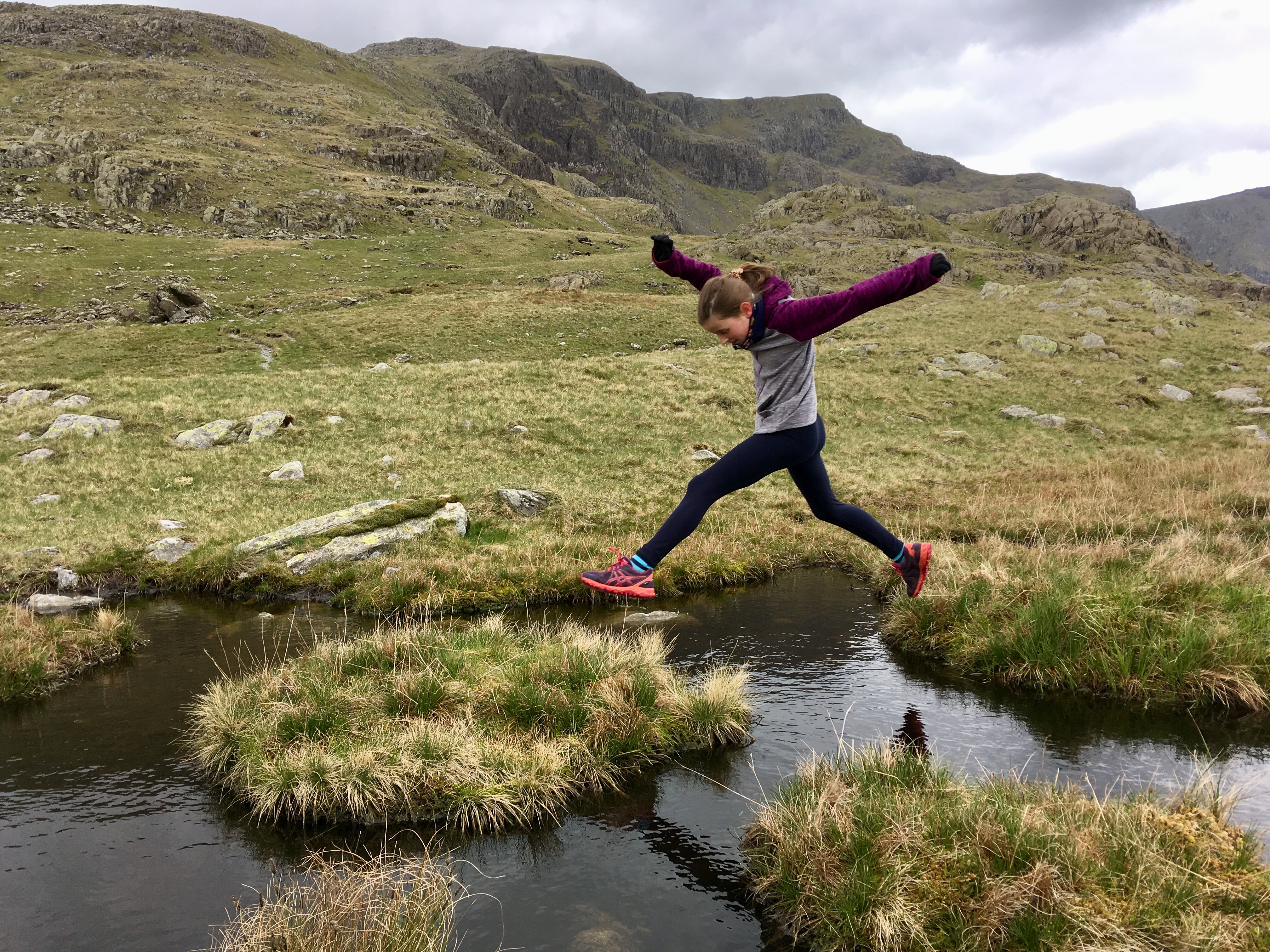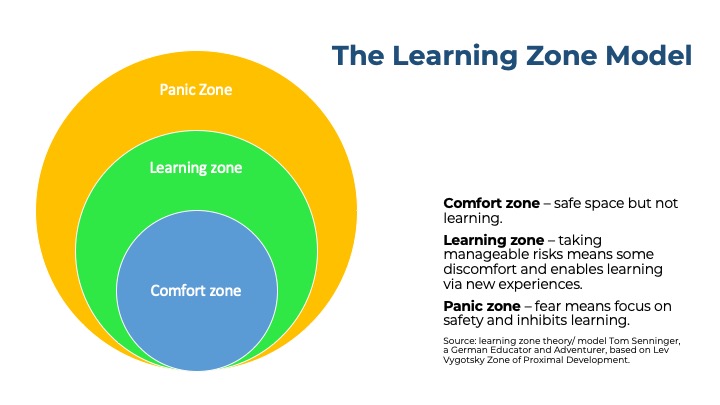
Building confidence: big leaps and baby steps
Ever feel like you lack confidence?
Confidence, like trust to which it is closely related, is one of those slippery things that can take ages to grow and seconds to destroy. And whilst those around you might have bags of confidence in you, it’s not uncommon for us to have far less confidence in ourselves. Sometimes we might label this ‘imposter syndrome’, sometimes it wraps itself up as a critical voice or ‘saboteur’ like the ‘people-pleaser’. But at the heart of many of the psychological blocks that can limit our potential is self-confidence.
I’ve been thinking a lot about confidence recently, and in particularly how as a coach I can best support my clients to build theirs. When, at the start of a coaching relationship, I ask what a client wants to achieve through our work ‘more confidence’ is probably one of the most common responses I hear.
I’ve noticed many clients reporting they have ‘lost their nerve’ during Lock Down. People who have not been able to do things for a year or so, due to Lock Down, are finding them harder to resume: be that going on stage or speaking at public meetings. I’ve heard many women say similar things about returning to work after a break for maternity leave.When we stop practising the things in our lives that take nerve we can lose our confidence. When we stop stretching our comfort zone, it seems to shrink.
So as a coach I’ve noticed a few things it might be helpful to share from reflecting on progress of clients and my own experiences (which I’m able to share more freely, whereas coaching clients’ stories are confidential).
How can we build confidence?
The area in my own life where I’ve developed most confidence in recent years has been in the mountains. But I realise what I’ve learned (and earned) in the hills has built my confidence across my life and work.
I have walked with friends and family since I could walk, but it wasn’t until far more recently that I felt comfortable doing so alone. When my kids were younger the only way I could realistically get into the big hills was without them, so I did my first ever solo mountain walk in the Pyrenees in 2012. It was a day walk on a route I’d walked a few years earlier with my Dad so I knew was easy to navigate and within my comfort zone in terms of how technical it was. I was nervous but it felt so good to be back in those glorious hills. The following week I went a step further doing a solo day walk in the Massif Central and area I didn’t know at all. It was scary but exhilarating.
Taking a bigger leap can have bigger benefits…
Then in 2018 I took a big step forward: I had planned to do a long hike in the Lakes to visit some new fells, but woke to discover it had snowed overnight, adding winter conditions into the mix. Snow can cover paths making navigation harder, and progress slower. Icy rocks can lead to slips and you don’t want to bang your head in a fall or sprain an ankle in bitterly cold winter conditions with no phone reception. Then the cloud decided to top the hills too, meaning that I could find myself with limited visibility. Telling myself I would turn round if it felt too dangerous, I set off early that morning feeling really quite nervous. I left detailed info with my husband in the valley below (with the kids) about my planned route and texted him an update of my progress as I reached each stage, relieved that I had phone coverage in places. At least they would know where to find my frozen body if I slipped and knocked myself unconscious….😉
By late morning the cloud had lifted and I was euphoric. The snow covering meant the fells looked even finer than usual and I had not seen another soul: I felt like an alpine explorer. I walked for 10 hours over ridges and 12 mountains, finishing with sore legs but about a hundred times’ more confidence than I had at 8am that morning.
A year later I ran the Coast-to-Coast route, an adventure which more than any other liberated me from the lack of confidence that was holding me back. This 191 mile route saw me traverse the Lakes solo, then the Pennines and Dales before finally being joined by a friend for morale support on the final 2 legs over the NY Moors. I already knew some sections of the route, which helped a lot with confidence, but I also encountered crap weather (cloud and a lot of rain) which made everything harder and I had never run so far in my life – it was like doing a marathon a day for a week. This adventure gave me the confidence make some changes at work which I badly wanted but had felt incredibly scary. ‘If I can do that, I can do anything’ was my thinking.
What my adventures have taught me is about how to stretch out of my comfort zone. In the mountains it’s sometimes a psychological risk (as a woman I can be scared at times of the threat of male violence when I’m on my own in a forest, miles from other people) but usually safety considerations are of the physical kind. Neuroscience actually suggests the brain responds in the same way to both types of fear. What I’ve learned is that it’s easiest to grow confidence in small steps: just one new risk each time. That might be doing a route solo that you’ve done with others before or doing a route you know in winter conditions or the dark. If we combine too many new risks at once then we might be too scared to try. For example, I would not have planned that long solo walk had I known it would snow.
But also, if we do take bigger risks – whether by design or accident – our confidence can leap forward. Bigger risk, bigger reward. Last year I did my first solo wild camp and a day of rock-climbing: both terrifying but possibly the best confidence boost I’ve had yet.
Go outside your comfort zone, but not too far…
Back at work, I used to find facilitation nerve-wracking. Holding a space for a group to solve their own challenges and working out the best ways to enable equal, productive contributions can feel like herding cats. But I took up the challenge suggested by the Gamestorming team – to try a new technique or exercise each time I ran a session. Whilst it feels safer to stick with tried and tested tools I have discovered some great new techniques as a result and feel more confident to be playful and responsive with groups now.

So when I saw the Learning Zone model recently, it resonated for me. This simple model shows 3 concentric zones – with risk/fear increasing as the circles become bigger. I think we could replace the ‘term’ Learning Zone with Confidence-Building Zone: that place where small risks help us grow.
Back to coaching, there are two main techniques I suggest when clients want to grow confidence. The first is to find a small step that feels like progress, but reasonably safe to them. If that goes OK then they take another, and another. Alongside I suggest this keeping a simple list of times when I took a risk, or when I was confident and what happened. It can be any size of risk and in any part of your life. I genuinely believe confidence we grow beyond work often seeps through into our work lives.
Confidence can be contagious for other areas of life…
A coaching client (who knows I’m sharing this story) wanted to grow her confidence in work meetings. She finds social situations awkward at times and told me she’d found joining a new sports team really helped her self-confidence. And the little steps she took to dare herself to try new things each time in a work meeting helped her in incrementally begin to be able to participate in the way she wanted. As a facilitator I know a few tools to help people feel at ease in meetings, like saying something low-risk early because the longer it goes before you say something the more nervous you often get, and I’ve offered these to several clients wanting to build confidence in the big formal settings in which many find they lack confidence to speak up. They report back that these small first steps which feel easy, build confidence a little which then makes possible further steps. And they slowly grow their confidence, step by step.
So if you’re looking to grow your confidence, or experience, I’d suggest finding some small first steps that will stretch yourself. Small risks which, if it’s a bit bumpy, won’t put you at risk. Then try another step. And maybe when you’re feeling brave you might think about taking a leap…. And the great thing is they can be little steps outdoors just as much as in the boardroom.
And if you would like support on that journey – get in touch for a chat about coaching.

Recent Comments